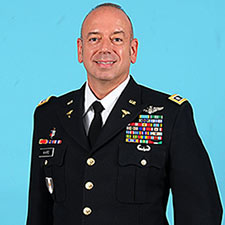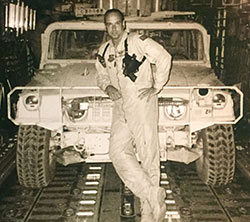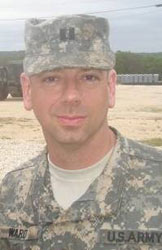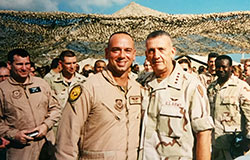 Pennsylvania-born-and-bred David Ward has lived a life that echoes the values in his home state’s motto: virtue, liberty and independence. With over 30 years of service in the U.S. military including several deployments in multiple conflicts, David has worked his way from the rank of private and army medic all the way up to lieutenant colonel and nurse anesthetist. Through The University of Alabama’s online coursework, he recently added another title to his resume: Doctor of Nursing Practice (DNP).
Pennsylvania-born-and-bred David Ward has lived a life that echoes the values in his home state’s motto: virtue, liberty and independence. With over 30 years of service in the U.S. military including several deployments in multiple conflicts, David has worked his way from the rank of private and army medic all the way up to lieutenant colonel and nurse anesthetist. Through The University of Alabama’s online coursework, he recently added another title to his resume: Doctor of Nursing Practice (DNP).
“I started to think about how I could improve my chance of getting to that next rank of a full-bird colonel, and I thought, Well, I should probably get my doctorate in Nursing. And that’s really the reason I pursued this degree.”
David earned his associate degree in Nursing from the Community College of Philadelphia in 1995 after training as a medic with the Army. He advanced his education with a Bachelor of Science in Nursing (BSN) from the University of Delaware in 2002, and then a Master of Science in Nurse Anesthesia from Drexel University in 2005. A decade later when he began thinking about doctoral programs, he carefully compared nursing doctorates offered around the country.
 “UA’s program was by far the cheapest, but it had that University of Alabama name on it, so it was a well-known school with a good reputation.” A friend and colleague of his had been in UA’s 100% online DNP for a year and a half at that point, and David said he valued his advice because he’s known for researching things inside and out. “He said, ‘It’s got the trifecta – it’s doable, it’s cheap, and it’s accessible.’”
“UA’s program was by far the cheapest, but it had that University of Alabama name on it, so it was a well-known school with a good reputation.” A friend and colleague of his had been in UA’s 100% online DNP for a year and a half at that point, and David said he valued his advice because he’s known for researching things inside and out. “He said, ‘It’s got the trifecta – it’s doable, it’s cheap, and it’s accessible.’”
In August 2017, David began taking classes in addition to his reserve military duties and his full-time work as a nurse anesthetist. With less than a year of the program under his belt, he experienced great heartache in his personal life when he lost his father to suicide. He remembers feeling a lot of support from his classmates and professors during that time. “I cannot sing the praises of the faculty and administrative staff of the program enough. They were very flexible and helpful. One of the faculty members had lost her son to suicide, and she expressed genuine empathy and concern for me, and that was greatly appreciated,” David said.
Since David is an advanced practice nurse in anesthesia, the coursework wasn’t strictly related to his field of practice, but he still found it helpful in his work. “The classwork is geared toward creating a capstone project, which, for me, was anesthesia related. The courses were all flexible enough that I was able to make them applicable to my area of practice,” David said. He is certain his classmates in other areas of nursing would share these sentiments.
 David’s capstone project focused on military and civilian nursing practice differences in responding to emergence delirium, when a patient wakes from anesthesia in an agitated or abnormal mental state. He noted that the extant research covers emergence delirium in pediatric and geriatric patients, but there’s not much information about it in regular adult patients. His research specifically focused on patients with PTSD or combat history awakening from anesthesia with emergence delirium. “Military nurses deal with it more often, and there’s not a lot of crosstalk about it. I found that there are differences in practice between military and civilian nurses. There are pharmacological interventions that military nurses have proven success with that can benefit civilian providers.”
David’s capstone project focused on military and civilian nursing practice differences in responding to emergence delirium, when a patient wakes from anesthesia in an agitated or abnormal mental state. He noted that the extant research covers emergence delirium in pediatric and geriatric patients, but there’s not much information about it in regular adult patients. His research specifically focused on patients with PTSD or combat history awakening from anesthesia with emergence delirium. “Military nurses deal with it more often, and there’s not a lot of crosstalk about it. I found that there are differences in practice between military and civilian nurses. There are pharmacological interventions that military nurses have proven success with that can benefit civilian providers.”
 David graduated in May 2020, and while he’s not up for promotion review with the Army until 2021, he is confident the DNP was a good choice, regardless of whether he advances to the rank of colonel or not. “Higher education is an investment, both of your time and your money. It should pay you back dividends. Even if I don’t get the rank, I don’t feel like I’ve wasted my money. I got the credentials, and I can find a way to use the degree in my nursing career, like if I want to teach one day. And it feels really good whenever I write it in my signature block to tell you the truth.”
David graduated in May 2020, and while he’s not up for promotion review with the Army until 2021, he is confident the DNP was a good choice, regardless of whether he advances to the rank of colonel or not. “Higher education is an investment, both of your time and your money. It should pay you back dividends. Even if I don’t get the rank, I don’t feel like I’ve wasted my money. I got the credentials, and I can find a way to use the degree in my nursing career, like if I want to teach one day. And it feels really good whenever I write it in my signature block to tell you the truth.”
“I did it part time in three years. You can have a full-time job and still do it. It wasn’t very expensive — it’s a very economical option. Even though I was in Pennsylvania and it was in Alabama, it was accessible.”
Published: November 10th, 2020

